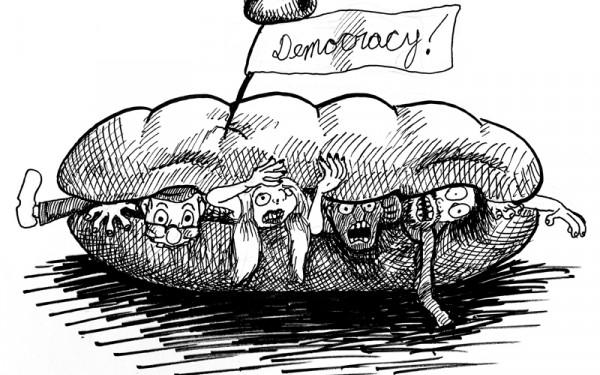CSU Won’t Commit To Strike, Promises Action
It’s been almost two months since students from across Quebec gathered on Nov. 10 to protest impending increases to tuition. While the Concordia student body’s elected leaders are promising further action, it’s still up in the air whether or not they will push for a general strike.
“The CSU will not necessarily be getting on that bandwagon,” said Concordia Student Union VP External Chad Walcott.
According to Walcott, it’s all a matter of timing.
“Some schools will go on strike earlier, some will go later,” said Walcott. “We still need to poll our students, see where we stand and rebuild our momentum—one month just won’t be enough time to do that for us.”
Though no official decisions have been made on whether a strike will happen or not, the CSU has planned at least one more Day of Action.
“March 22 will be the next major demonstration,” said Walcott. “We’re going to see how far we can push a Day of Action and whether or not strikes will be warranted if it comes to that.”
“We’re going to continue to give information about the tuition increase, as well as a parallel information campaign about what a strike is, what the benefits are and what the consequences could be,” said Walcott.
The CSU is currently working on a document that will be presented at the next council meeting on Jan. 11 that outlines the steps it plans to take throughout the semester.
“From there we will be able to move forward, depending on what is approved,” said Walcott. “Big decisions will have to be made at every level of Concordia’s student politics and governance [this semester.]”
The Graduate Students Association is planning its own moves with regard to striking, and making sure its members are informed and represented.
“As a GSA representative, I’m going to have to see how members feel about student strikes,” said GSA VP External Holly Nazar.
“[The GSA] has decided over the next couple months to go department by department and hold special general meetings. If people wanted to go on strike they can decide that on a departmental basis.”
“I think [Nov. 10] was really successful as a first step,” said Nazar. “But I think it would be a big mistake to think that what is going to change a government’s mind is just the demonstrations. This is going to take some real fighting.”
In the weeks following the Nov. 10 Day of Action, the issue of tuition fee increases dominated Quebec Parliament, as well as local and national media.
The day following the demonstration, the Quebec Ministry of Education launched a website devoted to outlining the advantages of a tuition increase. The ministry also reportedly spent $50,000 buying up Google keywords and the acronyms of student organizations to ensure top hits in a Google search.
To some members of the student movement, these reactions are a clear sign of progress.
“Look at the impact that we’ve had,” said Walcott. “We may not have won the battle, but we did make the government react, and we made them spend $50,000 as a response. […] A failure would have been no reaction at all. Support is starting to build, and there is still momentum, but there is a lot left to be done.”



_600_375_90_s_c1.jpg)
0webedit_600_375_90_s_c1.jpg)

_800_698_600_375_90_s_c1.jpg)